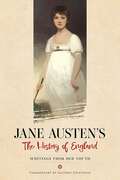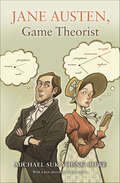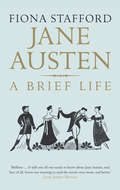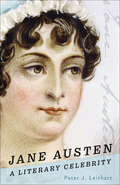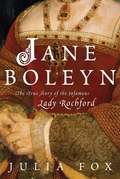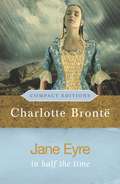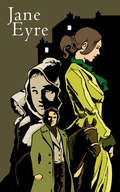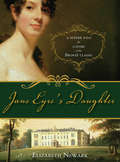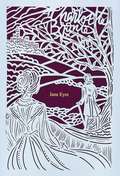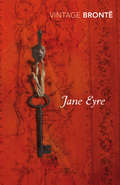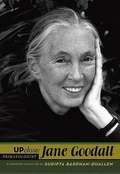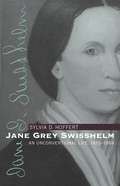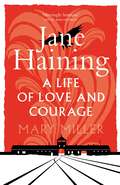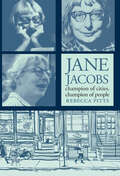- Table View
- List View
Jane Austen's Pride and Prejudice (Awesomely Austen - Illustrated and Retold #1)
by Jane Austen Katherine WoodfineA fresh, funny and accessible retelling of Jane Austen's best-known story, with witty black and white illustrations throughout.Elizabeth Bennet is the second eldest in a family of five daughters. Although their mother is very keen to see them all married to wealthy men, Elizabeth is determined that she will only ever marry for love. At a ball, Elizabeth meets Mr Darcy, who at first she believes is proud and haughty. But perhaps there is more to him than first meets the eye...Katherine Woodfine is best known for her historical series, The Sinclair Mysteries, which includes The Clockwork Sparrow. A huge fan of Jane Austen from a young age, she's perfectly placed to bring the Bennet sisters to a new audience. Eglantine Ceulemans captures all of Austen's satire and wit, bringing her colourful casts to life with warm and funny black and white illustrations.Illustrated and retold editions are also available for: Emma, Persuasion, Sense and Sensibility, Mansfield Park and Northanger Abbey. The perfect way to discover Austen for the first time, this bright and bold collection features some of the most inspiring and famous heroines in English literature. For readers aged eight and up.
Jane Austen's Pride and Prejudice (Awesomely Austen - Illustrated and Retold #10)
by Jane Austen Katherine WoodfineA fresh, funny and accessible retelling of Jane Austen's best-known story.Elizabeth Bennet is the second eldest in a family of five daughters. Although their mother is very keen to see them all married to wealthy men, Elizabeth is determined that she will only ever marry for love. At a ball, Elizabeth meets Mr Darcy, who at first she believes is proud and haughty. But perhaps there is more to him than first meets the eye...Katherine Woodfine is best known for her historical series, The Sinclair Mysteries, which includes The Clockwork Sparrow. A huge fan of Jane Austen from a young age, she's perfectly placed to bring the Bennet sisters to a new audience. Eglantine Ceulemans captures all of Austen's satire and wit, bringing her colourful casts to life with warm and funny black and white illustrations.Illustrated and retold editions are also available for: Emma, Persuasion, Sense and Sensibility, Mansfield Park and Northanger Abbey. The perfect way to discover Austen for the first time, this bright and bold collection features some of the most inspiring and famous heroines in English literature. For readers aged eight and up.
Jane Austen's Sense and Sensibility (Awesomely Austen - Illustrated and Retold #4)
by Jane Austen Joanna NadinA fresh, funny and accessible retelling of Jane Austen's classic story, with witty black and white illustrations throughout.When Elinor and Marianne Dashwood's father dies, they are forced to leave their home behind and move far away to a tiny cottage. Their lives look set to change for ever, in ways neither had expected. Elinor must leave behind the man she loves, whereas Marianne falls for their charming - but entirely unsuitable - new neighbour. The sisters will need each other's support if they are to find happiness, but will they ever find the right balance of sense and sensibility? Joanna Nadin is a winner of the Fantastic Book Award, the Surrey Book Award, Blue Peter 'Book of the Month' and Radio 4 Open Book 'Book of the Year'. She has recently fallen head over heels for Austen's books and wants new readers to feel the same.Eglantine Ceulemans captures all of Austen's satire and wit, bringing her colourful casts to life with warm and funny black and white illustrations.Illustrated and retold editions are also available for: Pride and Prejudice, Emma, Persuasion, Mansfield Park and Northanger Abbey. The perfect way to discover Austen for the first time, this bright and bold collection features some of the most inspiring and famous heroines in English literature. For readers aged eight and up.
Jane Austen's Sense and Sensibility (Awesomely Austen - Illustrated and Retold #4)
by Jane Austen Joanna NadinA fresh, funny and accessible retelling of Jane Austen's classic story, with witty black and white illustrations throughout.When Elinor and Marianne Dashwood's father dies, they are forced to leave their home behind and move far away to a tiny cottage. Their lives look set to change for ever, in ways neither had expected. Elinor must leave behind the man she loves, whereas Marianne falls for their charming - but entirely unsuitable - new neighbour. The sisters will need each other's support if they are to find happiness, but will they ever find the right balance of sense and sensibility? Joanna Nadin is a winner of the Fantastic Book Award, the Surrey Book Award, Blue Peter 'Book of the Month' and Radio 4 Open Book 'Book of the Year'. She has recently fallen head over heels for Austen's books and wants new readers to feel the same.Eglantine Ceulemans captures all of Austen's satire and wit, bringing her colourful casts to life with warm and funny black and white illustrations.Illustrated and retold editions are also available for: Pride and Prejudice, Emma, Persuasion, Mansfield Park and Northanger Abbey. The perfect way to discover Austen for the first time, this bright and bold collection features some of the most inspiring and famous heroines in English literature. For readers aged eight and up.
Jane Austen's The History of England: Writings from Her Youth
by Jane AustenThe author of one of the greatest romance novels of all time, Pride and Prejudice, takes her readers on a satiric tour through England’s history, mercilessly exploiting the comedic potential of human foibles within British royalty. Part of Jane Austen’s Juvenilia of the 1790s, The History of England was written during the author’s teenage years. Filled with puns and parodies, the history begins with the reign of Henry IV and concludes with the death of Charles I more than two centuries later. Originally intending it for circulation and performance among family and friends, Jane also commissioned her sister Cassandra to draw illustrations to complement her signature wit and humor. This volume includes an informative introduction providing background context, along with extensive editorial commentary. Austen fans and history buffs are sure to delight in this history written by “a partial, prejudiced, and ignorant historian.”
Jane Austen, Early and Late
by Freya JohnstonA reexamination of Austen’s unpublished writings that uncovers their continuity with her celebrated novels—and that challenges distinctions between her “early” and “late” workJane Austen’s six novels, published toward the end of her short life, represent a body of work that is as brilliant as it is compact. Her earlier writings have routinely been dismissed as mere juvenilia, or stepping stones to mature proficiency and greatness. Austen’s first biographer described them as “childish effusions.” Was he right to do so? Can the novels be definitively separated from the unpublished works? In Jane Austen, Early and Late, Freya Johnston argues that they cannot.Examining the three manuscript volumes in which Austen collected her earliest writings, Johnston finds that Austen’s regard and affection for them are revealed by her continuing to revisit and revise them throughout her adult life. The teenage works share the milieu and the humour of the novels, while revealing more clearly the sources and influences upon which Austen drew. Johnston upends the conventional narrative, according to which Austen discarded the satire and fantasy of her first writings in favour of the irony and realism of the novels. By demonstrating a stylistic and thematic continuity across the full range of Austen’s work, Johnston asks whether it makes sense to speak of an early and a late Austen at all.Jane Austen, Early and Late offers a new picture of the author in all her complexity and ambiguity, and shows us that it is not necessarily true that early work yields to later, better things.
Jane Austen, Game Theorist: Updated Edition
by Michael Suk-Young ChweHow the works of Jane Austen show that game theory is present in all human behaviorGame theory—the study of how people make choices while interacting with others—is one of the most popular technical approaches in social science today. But as Michael Chwe reveals in his insightful new book, Jane Austen explored game theory's core ideas in her six novels roughly two hundred years ago—over a century before its mathematical development during the Cold War. Jane Austen, Game Theorist shows how this beloved writer theorized choice and preferences, prized strategic thinking, and analyzed why superiors are often strategically clueless about inferiors. Exploring a diverse range of literature and folktales, this book illustrates the wide relevance of game theory and how, fundamentally, we are all strategic thinkers.
Jane Austen: A Brief Life
by Fiona StaffordEvery devoted reader feels that, in some way, they know Jane Austen. But how can we make sense of her extraordinary achievements? At a time when most women received so little formal education and none could obtain a place at university, how did Austen come to write novels that have commanded the attention of some of the most brilliant minds ever since? Why were hers the books that Darwin knew by heart and Churchill read during the Blitz? In this graceful introduction to the author’s life and works, Fiona Stafford offers a fresh and accessible perspective, discussing Austen’s six astonishing novels in the context of their time. Newly updated, Jane Austen: A Brief Life offers a rich and sympathetic insight into a writer who was just as much the Romantic genius as Keats, Shelley or Byron – full of youthful exuberance, intensely creative once she had found her individual voice, and dead before she reached middle age.
Jane Austen: A Literary Celebrity (Christian Encounters)
by Peter J. LeithartJane Austen is famous for such books as Persuasion, Pride and Prejudice, and Emma. Now learn about the author&’s journey through a life spent making up stories that touched the lives of millions.Jane Austen is now what she never was in life, and what she would have been horrified to become--a literary celebrity. &“Janeia&” is the author&’s term for the mania for all things Austen. Dive into Jane Austen: A Literary Celebrity and discover:how it all began and Austen&’s love of poetryher early masterpieces and the inspiration behind the storiesher road to getting published and the health decline that led to her deathIn this updated edition, you&’ll also find discussion questions that work well for book clubs and ELA lesson plans. This biography is perfect for:Jane Austen fans and collectorsmen and women who have enjoyed Austen-inspired films and TV series adaptationsanyone interested in learning about the varied sides of Austen&’s character and the characters she createdJane Austen: A Literary Celebrity is a fascinating look at a woman who never meant to be famous.
Jane Boleyn: The Infamous Lady Rochford
by Julia FoxJane Rochford was sister-in-law to Anne Boleyn and Lady of the Bedchamber to Katherine Howard, whom she followed to the scaffold in 1542. Hers is a life of extraordinary drama as a witness to and participant in the greatest events of Henry's reign. She arrived at court as a teenager when Katherine of Aragon was queen. Even before Henry's marriage to Anne, her own marriage to George Boleyn brought her into the closest royal circles - and there she remained through the unfolding spectacle and tragedy of Henry's succession of marriages. She survived the trauma of Anne and George's executions and despite briefly being banned from Court managed to regain her place there to attend on Jane Seymour and Anne of Cleves. Her supposed part in both Anne Boleyn's and Katherine Howard's downfall has led to her being reviled through centuries. In this fascinating biography Julia Fox repudiates the idea of the infamous Lady Rochford and Jane emerges as a rather modern woman forced by brutal circumstance to fend for herself in a politically lethal world.
Jane Boleyn: The Infamous Lady Rochford
by Julia FoxThe story of Henry VIII's queens - as seen through the eyes of Jane Rochford, sister-in-law to Anne Boleyn and cousin to Katherine Howard.'Outstanding ... fascinating and moving' Amanda Foreman, bestselling author of THE DUCHESSJane Rochford was sister-in-law to Anne Boleyn and Lady of the Bedchamber to Katherine Howard, whom she followed to the scaffold in 1542. Hers is a life of extraordinary drama as a witness to, and participant in, the greatest events of Henry's reign.She arrived at court as a teenager when Katherine of Aragon was queen. Even before Henry's marriage to Anne, her own marriage to George Boleyn brought her into the closest royal circles - and there she remained through the unfolding spectacle and tragedy of Henry's succession of marriages. She survived the trauma of Anne and George's executions and despite briefly being banned from Court managed to regain her place there to attend on Jane Seymour and Anne of Cleves. Her supposed part in both Anne Boleyn's and Katherine Howard's downfall has led to her being reviled through centuries.In this fascinating biography Julia Fox repudiates the idea of the infamous Lady Rochford and Jane emerges as a rather modern woman forced by brutal circumstance to fend for herself in a politically lethal world.
Jane Campion (Routledge Film Guidebooks)
by Deb VerhoevenJane Campion is one of the most celebrated auteurs of modern cinema and was the first female director to be awarded the prestigious Palme d'Or. Throughout her relatively short career, Campion has received extraordinary attention from the media and scholars alike and has provoked fierce debates on issues such as feminism, colonialism, and nationalism. In this detailed account of Jane Campion's career as a filmmaker, Deb Verhoeven examines specifically how contemporary film directors 'fashion' themselves as auteurs – through their personal interactions with the media, in their choice of projects, in their emphasis on particular filmmaking techniques and finally in the promotion of their films. Through analysis of key approaches to Campion's films, such as The Piano; In the Cut; Sweetie; An Angel at My Table; and Holy Smoke Deb Verhoeven introduces students to the passionate debates surrounding this controversial and often experimental director Featuring a career overview, a filmography, scene by scene analysis and an extended interview with Campion on her approach to creativity, this is a great introduction to one of the most important directors of contemporary cinema.
Jane Eyre
by Charlotte BronteOrphaned at an early age, Jane Eyre survives an unhappy childhood at the grim Lowood School. Despite Jane's deprived background, her intelligence and courage earn her a position as a governess at the imposing home of Mr Rochester. Overcoming her sense that all at Thornfield Hall is not as it seems, Jane finds herself becoming fond of her new life. But she finds it increasingly hard to maintain her composure. As her cautious friendship with her often moody master deepens, Jane opens herself up to the possibility of happiness at last. But Thornfield Hall conceals secrets that are conspiring against their happiness.
Jane Eyre
by Charlotte BronteJane begins life penniless and plain: an unlikely romantic heroine. But she is as indomitable in spirit as she is frail in appearance. Taking a position as a governess at Thornfield Hall, her relationship with her employer, the enigmatic Mr Rochester intensifies, until she is forced to choose between the desires of her heart and the demands of a 'moral' society.(P)1995 Hodder & Stoughton Audiobooks
Jane Eyre
by Charlotte BrontëA masterpiece of nineteenth-century English Literature, Charlotte Bronte's Jane Eyre follows the titular character as she attempts to rise from humble beginnings to find independence and love. Jane is a passionate and intelligent woman who struggles in life until she secures the job as governess for the wealthy, kind Edward Rochester. At Thornfield Hall, Rochester's estate, Jane finds herself falling for her employer, and though the feelings are reciprocated, Rochester also has a terrible secret that threatens their future together. Jane Eyre is not only a classic romance, but has been praised for its penetrating depiction of Jane's inner moral and intellectual struggles, and is still read widely to this day.
Jane Eyre's Daughter
by Elizabeth NewarkA passionate young woman of high courage... IN THIS SEQUEL TO JANE EYRE, young Janet Rochester is consigned to Highcrest Manor and the guardianship of the strict Colonel Dent while her parents journey to the West Indies. As Janet struggles to make a life for herself, guided by the ideals of her parents, she finds herself caught up in the mysteries of Highcrest. Why is the East Wing forbidden to her? What lies behind locked gates? And what is the source of the voices she hears in the night? Can she trust the enigmatic Roderick Landless, or should she transfer her allegiance to the suave and charming Sir Hugo Calendar? Whether riding her mare on the Yorkshire moors, holding her own with Colonel Dent, or waltzing at her first ball, Janet is strong, sympathetic, and courageous. After all, she is her mother's daughter... "THE VERY FIRST SCENE PULLED ME IN AND THE SUSPENSE CONTINUED TO BUILD TO THE VERY END. I'M VERY IMPRESSED!" - Historical-Fiction.com
Jane Eyre: An Autobiography (Norton Critical Editions Ser. #0)
by Charlotte Bronte<p>Initially published under the pseudonym Currer Bell in 1847, Charlotte Brontë’s <i>Jane Eyre</i> erupted onto the English literary scene, immediately winning the devotion of many of the world’s most renowned writers, including William Makepeace Thackeray, who declared it a work “of great genius.” <p>Widely regarded as a revolutionary novel, Brontë’s masterpiece introduced the world to a radical new type of heroine, one whose defiant virtue and moral courage departed sharply from the more acquiescent and malleable female characters of the day. <p>Passionate, dramatic, and surprisingly modern, <i>Jane Eyre</i> endures as one of the world’s most beloved novels.</p>
Jane Eyre: An Autobiography (Seasons Series)
by Charlotte BronteA fine exclusive edition of one of literature&’s most beloved stories with full page call-outs with quotes from summer.It was quiet at the other end of the house; but I knew my way; and the light of the unclouded summer moon, entering here and there at passage windows, enabled me to find it without difficulty.Throughout the hardships of her childhood, Jane Eyre clings to a sense of self-worth, despite the maltreatment from those close to her. At the age of eighteen, sick of her narrow existence, Jane seeks work as a governess. The monotony of her new life at Thornfield Hall is derailed by the arrival of her peculiar and volatile employer, Mr. Rochester.A flagship of Victorian fiction, Jane Eyre intrigues readers through the vigorous courage of Jane's voice, a forceful depiction of childhood injustice, an unflinching examination of the restraints placed upon women, and a worthy exploration into the complexities of both faith and passion.Jane Eyre (Seasons Edition--Summer) is one of four titles available in June 2020. The summer season also will include The Adventures of Huckleberry Finn, Persuasion, and The Wonderland Collection.
Jane Eyre: Illustrations By Marjolein Bastin (Marjolein Bastin Classics Ser.)
by Charlotte BronteJane Eyre is the inspiring heroine of one of the best-loved British novels of all time. As an orphan, Jane's childhood is not an easy one but her independence and strength of character keep her going through the miseries inflicted by cruel relatives and a brutal school. However, her biggest challenge is yet to come. Taking a job as a governess in a house full of secrets, for a passionate man she grows more and more attracted to, ultimately forces Jane to call on all her resources in order to hold on to her beliefs.
Jane Eyre: Teacher's Book
by Charlotte BronteA masterpiece of nineteenth-century English Literature, Charlotte Bronte's Jane Eyre follows the titular character as she attempts to rise from humble beginnings to find independence and love. <P><P>Jane is a passionate and intelligent woman who struggles in life until she secures the job as governess for the wealthy, kind Edward Rochester. At Thornfield Hall, Rochester's estate, Jane finds herself falling for her employer, and though the feelings are reciprocated, Rochester also has a terrible secret that threatens their future together. Jane Eyre is not only a classic romance, but has been praised for its penetrating depiction of Jane's inner moral and intellectual struggles, and is still read widely to this day.
Jane Goodall
by Bardhan-Quallen SudiptaUp Close: Jane Goodall by Sudipta Bardhan-Quallen Up Close: Thurgood Marshall by Chris Crowe A trailblazing scientist made famous by her favorite primates. Jane Goodall will forever be linked with the chimpanzees that she?s studied for over fifty years. A pioneer in scientific research, she revolutionized longstanding views about chimps, forest conservation, and women in scientific fields. This Up Close biography tells the story of how a demure young woman from London went to Africa and changed the world. .
Jane Grey Swisshelm: An Unconventional Life, 1815-1884
by Sylvia D. HoffertNineteenth-century newspaper editor Jane Grey Swisshelm (1815-1884) was an unconventionally ambitious woman. While she struggled in private to be a dutiful daughter, wife, and mother, she publicly critiqued and successfully challenged gender conventions that restricted her personal behavior, limited her political and economic opportunities, and attempted to silence her voice. As the owner and editor of newspapers in Pittsburgh; St. Cloud, Minnesota; and Washington, D.C.; and as one of the founders of the Minnesota Republican Party, Swisshelm negotiated a significant place for herself in the male-dominated world of commerce, journalism, and politics. How she accomplished this feat; what expressive devices she used; what social, economic, and political tensions resulted from her efforts; and how those tensions were resolved are the central questions examined in this biography. Sylvia Hoffert arranges the book topically, rather than chronologically, to include Swisshelm in the broader issues of the day, such as women's involvement in politics and religion, their role in the workplace, and marriage. Rescuing this prominent feminist from obscurity, Hoffert shows how Swisshelm laid the groundwork for the "New Woman" of the turn of the century.
Jane Haining: A Life of Love and Courage
by Mary MillerA &“very moving biography&” of a courageous woman who gave her life in order to stay with her orphaned students during the Nazi invasion of Hungary (Scotsman). A farmer&’s daughter from Scotland, Jane Haining went to work at the Scottish Jewish Mission School in Budapest in 1932, where she was a boarding school matron in charge of around fifty orphan girls. Jane was back in the UK on holiday when war broke out in 1939, but she immediately went back to Hungary to do all she could to protect the four hundred children at the school, most of them Jewish. She refused to leave in 1940, and again ignored orders to flee the country in March 1944 when Hungary was invaded by the Nazis. She remained with her pupils, writing &“if these children need me in days of sunshine, how much more do they need me in days of darkness.&” Her brave persistence led to her arrest by the Gestapo in April 1944, for &“offenses&” that included spying, working with Jews, and listening to the BBC. She died in the Nazi concentration camp at Auschwitz just a few months later, at the age of forty-seven. This story of her courage and self-sacrifice, her choice to stay and protect the children in her care, is &“an inspiring tale of quiet heroism&” (Neil MacGregor). &“Haining&’s firm moral compass emerges clearly, making her story heroic as well as heart-rending. Materially, she may have left little behind, but her legacy is enduring.&” —Church Times
Jane Hope
by Elizabeth Janet GrayJane Hope was twelve when her mother, a widow, returned with her children to live in her father's house at Chapel Hill, North Carolina. Jane dreamed of the excitement of living in a college town, of romance with herself as the heroine. Jane was always helping out some stray or other, from dogs, cats to people, and it was Stephen Farthing whom she rescued who later fell in love with her. This is a story of life at Chapel Hill just before the Civil War.
Jane Jacobs: Champion of Cities, Champion of People
by Rebecca PittsThe first biography of Jane Jacobs for young people, the visionary activist, urbanist, and thinker who transformed the way we inhabit and develop our cities.Jane Jacobs was born more than a hundred years ago, yet the ideas she popularized—about cities, about people, about making a better world—remain hugely relevant today. Now, in Jane Jacobs: Champion of Cities, Champion of People, we have the first biography for young people of the visionary activist, urbanist, and thinker.Debut author Rebecca Pitts draws on archives and Jacobs&’s own writings to paint a vivid picture of a headstrong and principled young girl who grew into one of the most important advocates of her time, and whose impact on the city of New York in particular can still be seen today. Jacobs went against the conventional wisdom of the time that said cities should be designed by so-called experts, &“cleaned up,&” and separated by use, arguing that such pie-in-the-sky visions paid very little attention to the wants and needs of people who actually live in cities. Jane instead championed diversity, community, &“the life of the street,&” and the power of grassroots movements to make cities better and more equitable for all. She never backed down, even when it meant going up against the most powerful man in New York, Robert Moses.Here is a story of standing up for what you know is right, with real-world takeaways for young activists. Jane Jacobs: Champion of Cities, Champion of People emphasizes how today&’s teens can take inspiration from Jane&’s own activism &“playbook,&” promoting change by focusing on local issues and community organizing.



